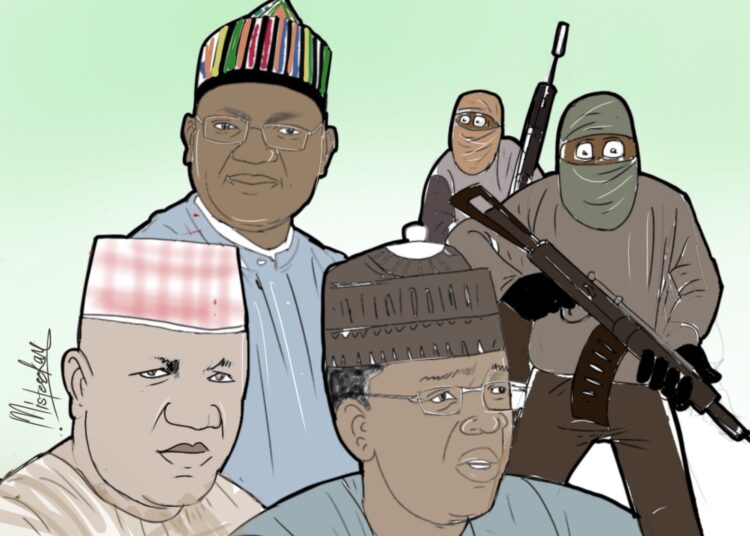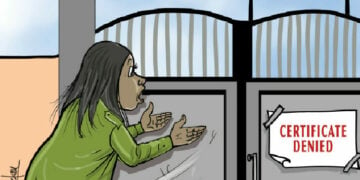This week, while notorious serial killer and wanted terrorist Bello Turji was holed up in his Zamfara forest hideout, restating his claims that former Zamfara state governor and junior minister of Defence, Bello Mohammed Matawalle, is behind the terrorism and killings in the state, Benue state governor, Fr. Hyacinth Alia was telling a congregation that the violence and indeed, killings in Benue is the work of Abuja politicians..
Endless Killings
Benue and Zamfara states shared one thing in common. They are both plagued by relentless insecurity, arising largely from activities of bandits and other terror elements. Mass killings and displacements, especially in rural areas, have gradually become the defining features of these states. Zamfara for one, has known little peace for nearly two decades. For instance, during former Governor Abdulazeez Yari’s tenure, the state endured senseless killings. It became so dire that Yari renounced his chief security officer title.
Yari’s successor, Bello Matawalle, brought very little or no relief. The violence persisted through his four-year rule, leaving Zamfara state a continuous killing field. Farmers pay taxes to access their lands, and traders risk abduction or death on their way to or from markets. For a state populated by predominantly farmers and traders, Zamfara’s story is one of agony, pain, and anguish.
In the wake of Turji’s shocking allegations, many have hastily linked them to politics. A serious nation would have swiftly moved to bring Turji to justice and thoroughly investigate his claims.
Like Zamfara, Benue state has suffered ongoing violence, causing mass displacement. But even before the present administration in the state came on board, there had been killings under the administration of Governor Ortom whom many accused of using it as a shield for his ineptitude and clear lack of focus. But then the killings continue unabated.
Amnesty International reported that between January 2023 and February 2024, attacks in Benue claimed at least 2,600 lives, mostly women and children. Eighteen out of Benue’s 23 local government areas have faced sustained attacks, severely impacting food security.
The United Nations estimates that 2.1 million people have been displaced by these attacks. Of course, some of those displaced are now taking refuge in camps. Benue, known as the nation’s food basket, sees most of its farmers turned into internally displaced persons (IDPs). As should be expected, this is significantly affecting food production.
A Governor’s Exposé
Governor Fr. Hyacinth Alia’s recent declaration which blames Abuja politicians for Benue’s troubles, challenges his predecessor Samuel Ortom’s narrative. Ortom had attributed the violence to armed Fulani herdsmen whom he claimed killed over 6,000 persons in a series of attacks on the state.
Governor Alia, however, asserts that the killers are local, armed youths supported by Abuja politicians. His statement came amid fresh killings and a viral video of bandits threatening more violence. “My anxiety and the deeper wounds I feel about this is that the so-called Abuja politicians are the ones sponsoring and supporting these young men,” he said.
More than anything else, the governor’s declaration has left more room for questions that perhaps only he can provide concise answers that will help untie what has since become the Benue gordian knot.
To begin with, Benue, like all states of the federation, has so many politicians in Abuja. Are these politicians in the national assembly or in the federal executive council? Are they in or out of office? Is Governor Alia referring to former governors or their political lackeys?
More than anything else, Governor Alia’s expose further lent credence to the widely held notion that the raging insecurity across the country is largely fueled by some vested interests. We have been told repeatedly about terror financiers who the government has failed to unmask despite assurances.
Many Nigerians believe that the political elite, often in collusion with unscrupulous security officials, are behind these killings for personal gain. These allegations, typically dismissed as speculation, take on new weight coming from Governor Alia, who without doubt, spoke from an informed position.
Despite years of denial, the previous administration of President Muhammadu Buhari left office without naming the sponsors of terrorism. Governor Alia, like the clergyman he is, has bravely confronted this issue. But what comes next?
What Next?
Having identified the culprits, Governor Alia must act to protect Benue’s people. Simply revealing that Abuja politicians are behind the violence isn’t enough. He must publicly name them and prosecute them. The 1999 constitution empowers the state’s Attorney General to initiate criminal proceedings. Governor Alia must direct the Attorney General to act immediately, or we might assume he’s merely playing politics.
As a clergyman, Governor Alia is well aware of the moral imperative against killing. He sure would have had cause to remind his congregation many times of Matthew 5:21, “…you shall not murder, and anyone who murders will be subject to judgment.”
All those killed or displaced in Benue state deserve justice and ensuring that entails using the instrumentality of the nation’s law so that those behind the killings, as exposed by Governor Alia, face the full wrath of the law.
I expect the Benue state chapter of Nigeria Bar Association, the civil society organisations in the state and indeed, the media, to mobilise efforts in compelling the state government to act now, without any delay.
The time is long overdue to hold our leaders’ feet to the fire by using all the necessary avenues within the nation’s law, in compelling them to do the needful.
Governor Alia must not only name and shame but also ensure these politicians face justice. Nigerians deserve to know who is behind the relentless attacks in Benue. The governor should unmask them without delay. Perhaps Benue will be the starting point for justice. Governor Alia, who are they?











